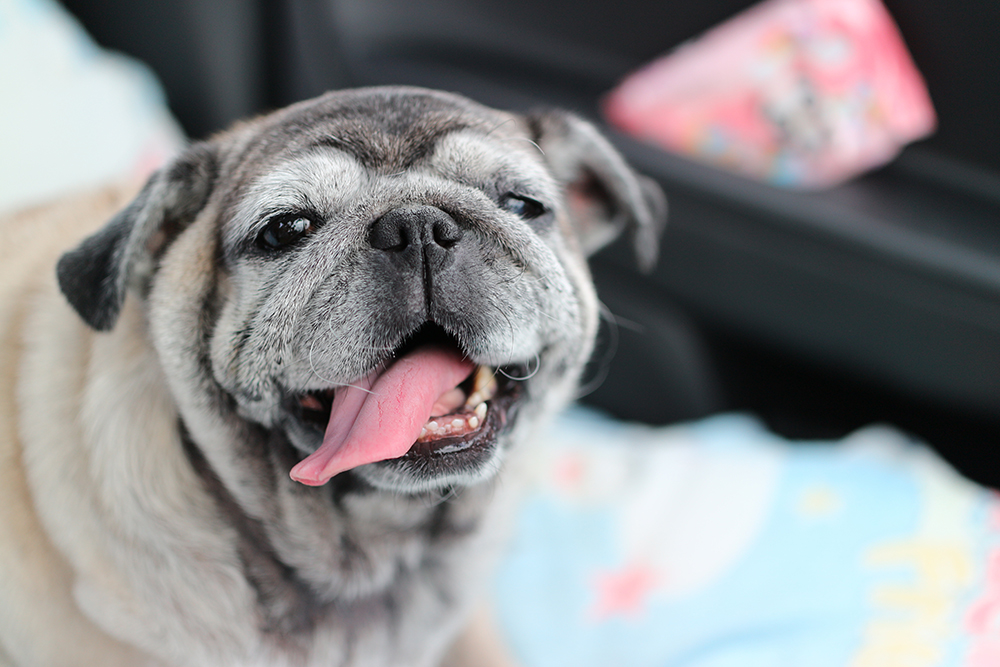In many cases, panting is a completely normal behavior in dogs, but there are times when panting can be an indication of an underlying health condition. If your dog is panting at night, it could be a sign that something is amiss. Here, our Cordova vets share some causes of nighttime panting in dogs, and what you should do.
Why does my dog pant at night?
Panting is a normal bodily process for your dog which works as an effective way to regulate their body temperature. That said, panting at night is a different matter - especially when there is no obvious reason for the dog's distress.
After a long walk in humid weather, an energetic play session, or excitement, it is perfectly normal for your pup to be panting, but panting accompanied by restless behavior (e.g. pacing) in mild or ideal weather conditions, or during the night when it is cooler, could be a sign of something more serious.
What could cause my dog to pant excessively?
Some of the potential reasons for excessive panting could include:
- Heatstroke. Heatstroke in dogs is a serious issue and can have fatal consequences if left untreated. Heatstroke in dogs is more likely in temperatures over 106°F (41°C) and causes heavy panting, which leads to dehydration. High temperatures are especially hard on short-nosed breeds like pugs, but you must never leave a dog of any breed alone in a car in warm weather, as they can overheat or suffer from heatstroke quickly.
- Cushing’s Disease. This is when the bloodstream has a buildup of too much cortisol. Along with panting, other symptoms of Cushing's Disease in dogs include an increase in thirst, increased hunger, frequent urination, hair loss, and a pot-bellied appearance. This issue is commonly seen in senior dogs and is often one of the reasons for abnormal heavy panting.
- Respiratory disease. Respiratory issues impact your dog's ability to breathe, making it hard for them to receive the oxygen their bloodstream needs to carry throughout their body. A dog with respiratory issues might pant heavily or struggle to breathe after even light exercise. If you notice your canine companion's tongue is no longer a healthy pink but instead blue, purple, or grey, head to the vet immediately for treatment; your dog may be experiencing oxygen deprivation.
- Heart disease. Excessive panting and coughing can be a symptom of heart disease or failure, which can majorly impact your dog's ability to breathe. In these cases, you may notice your dog panting heavily after walking for a short distance.
What could cause nighttime panting?
Below are some other common causes of panting and restlessness in dogs during the night:
- Stress or anxiety. This can be caused by upsetting events like loud thunderstorms or fireworks, or issues like separation anxiety.
- Environmental issues. Puppies and senior dogs have a harder time coping with high nighttime temperatures, and dogs with untreated allergies often have disrupted sleep.
- Pain or Discomfort. Dogs experiencing pain from an injury or a condition such as arthritis may exhibit nighttime panting and/or pacing behaviors. (e.g. injury, arthritis, allergies)
- Canine Cognitive Disorder (dog dementia). Dogs affected by this disorder often have disturbed sleep-wake cycles and may exhibit excessive panting and restlessness.
When should my dog see a vet?
If your dog exhibits symptoms of excessive nighttime panting, pacing, or other anxious behaviors get in touch with your vet to find out whether your dog should be seen by them.
If you spot any signs of heatstroke in your dog, immediately take them for urgent veterinary care during clinic hours, or treatment after hours at a nearby emergency veterinary hospital. Your veterinarian will examine your canine companion, perform any necessary diagnostic and treatment procedures, and work with you to help your dog feel better today and tomorrow.
Note: The advice provided in this post is intended for informational purposes and does not constitute medical advice regarding pets. For an accurate diagnosis of your pet's condition, please make an appointment with your vet.
Wondering why your dog is panting at night? Contact our Cordova vets today to book an examination for your pup.
Looking for a vet in Cordova and Greater Memphis area?
We're always accepting new patients, so contact our veterinary hospital today to book your pet's first appointment.
Related Articles View All
Dog Eye Injury - What to Do
Our vets know you work hard to protect and care for your dog. Nonetheless, eye injuries can happen. Here, we discuss common types of eye injuries in dogs as well as the causes, symptoms, and what to do if your dog has an eye injury.
My Dog Keeps Shaking Their Head. Should I be Worried?
Is your dog repeatedly shaking their head? Today's post explores the subject of head shaking in dogs, what to do, and when to head to the vet.
Why is my dog drooling?
The safety of dog bones has become a contentious topic and one that many pet parents are eager to understand. Are bones good for dogs? What bones can dogs eat safely? Today, we discuss some pros and cons of giving dogs bones, to help you make an informed decision.
Can dogs eat bones?
The safety of dog bones has become a contentious topic and one that many pet parents are eager to understand. Are bones good for dogs? What bones can dogs eat safely? Today, we discuss some pros and cons of giving dogs bones, to help you make an informed decision.

